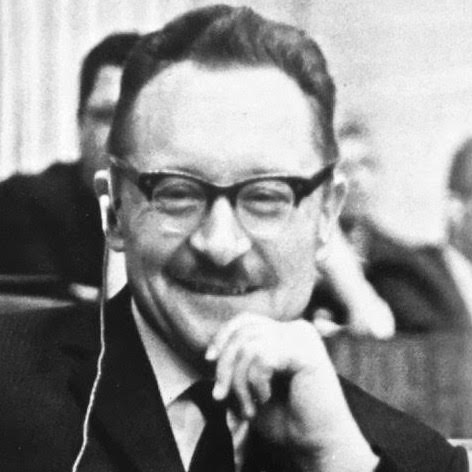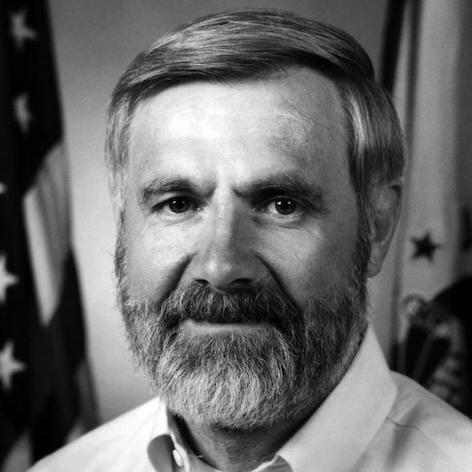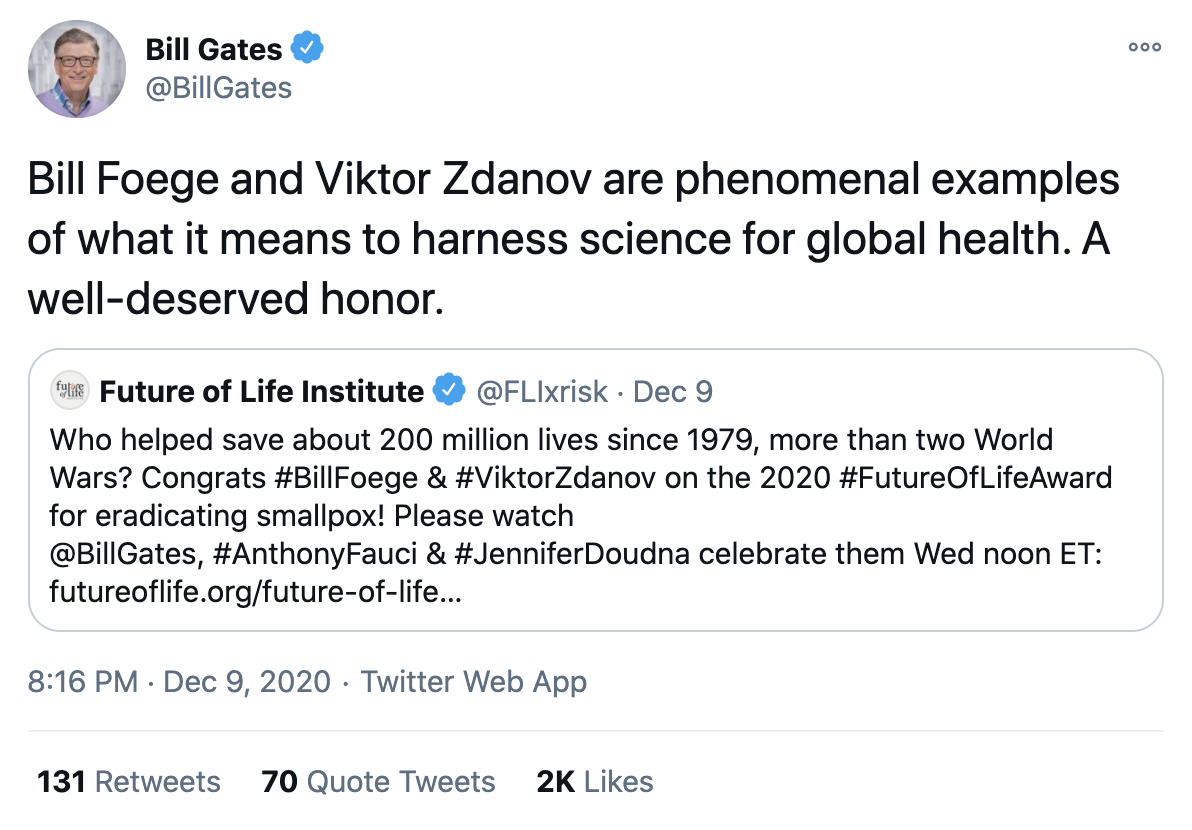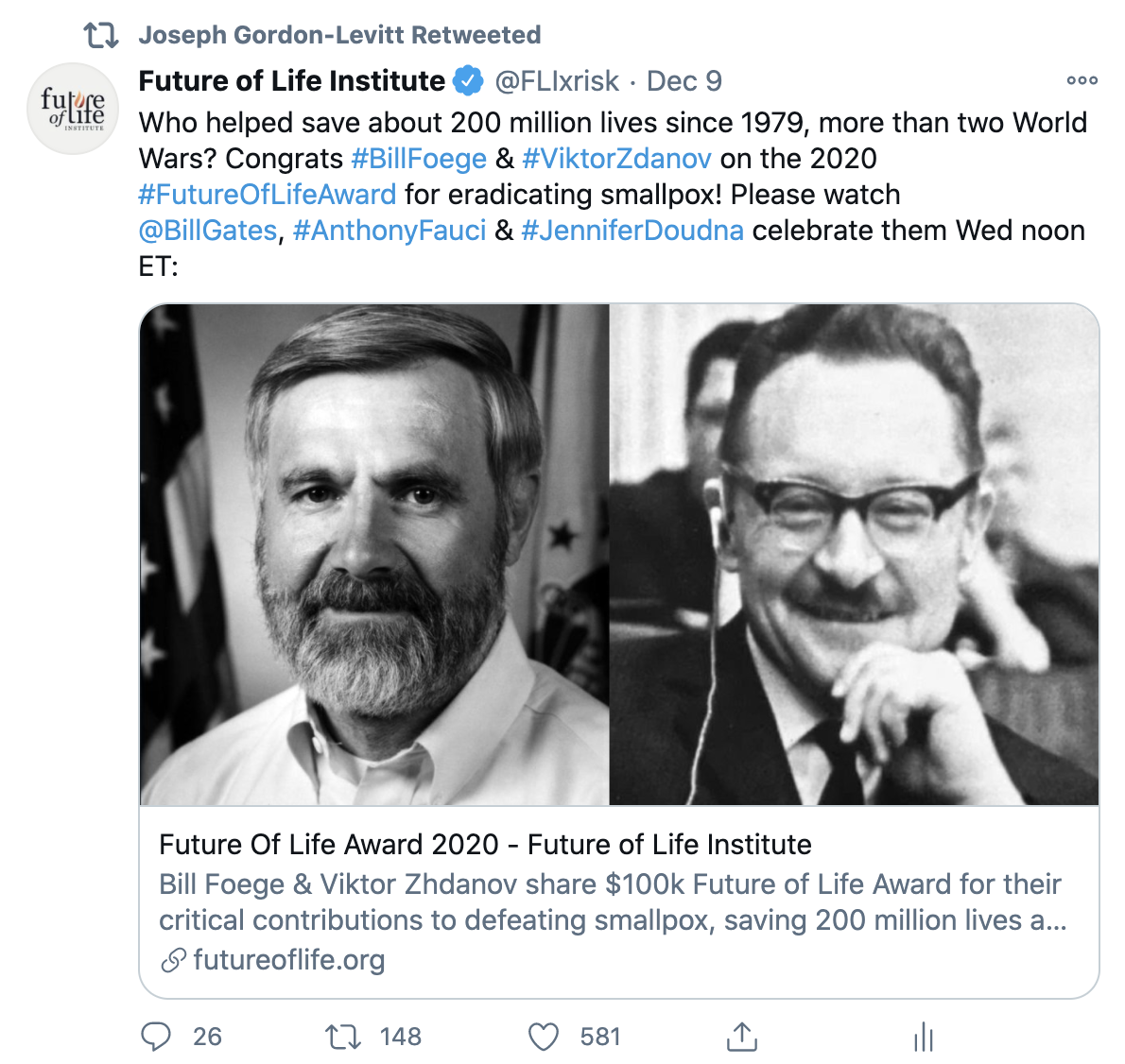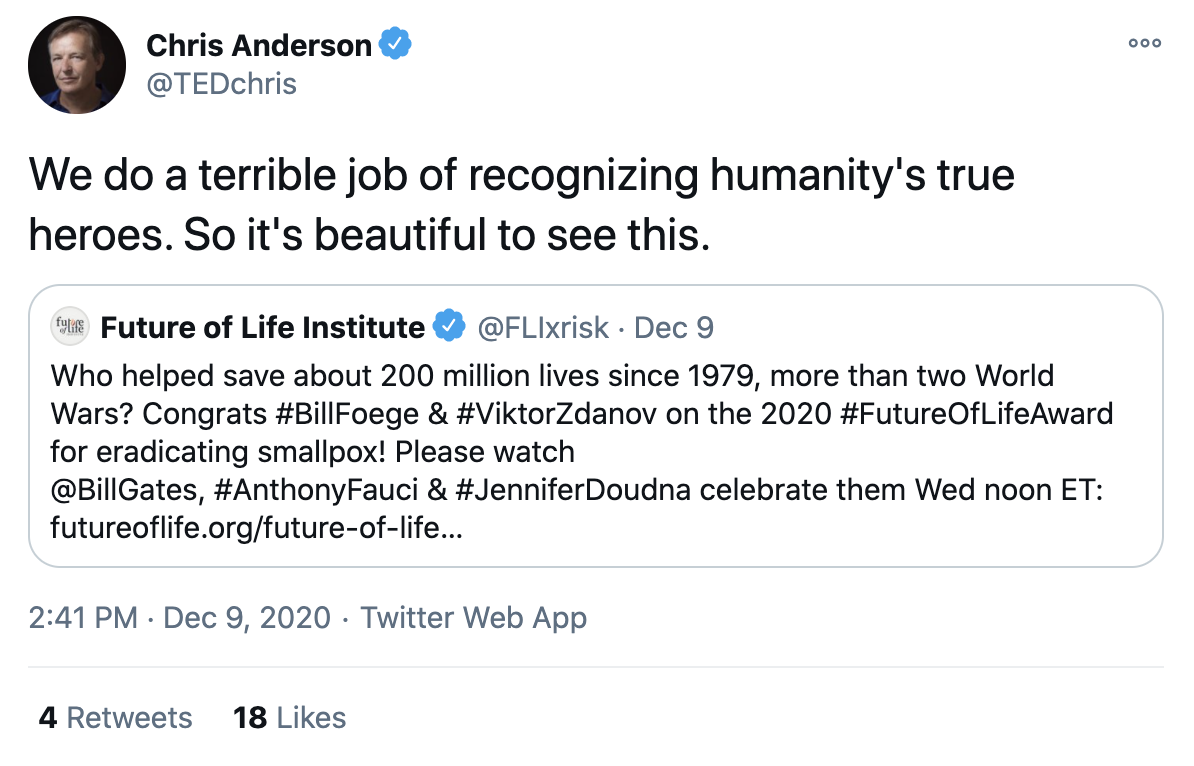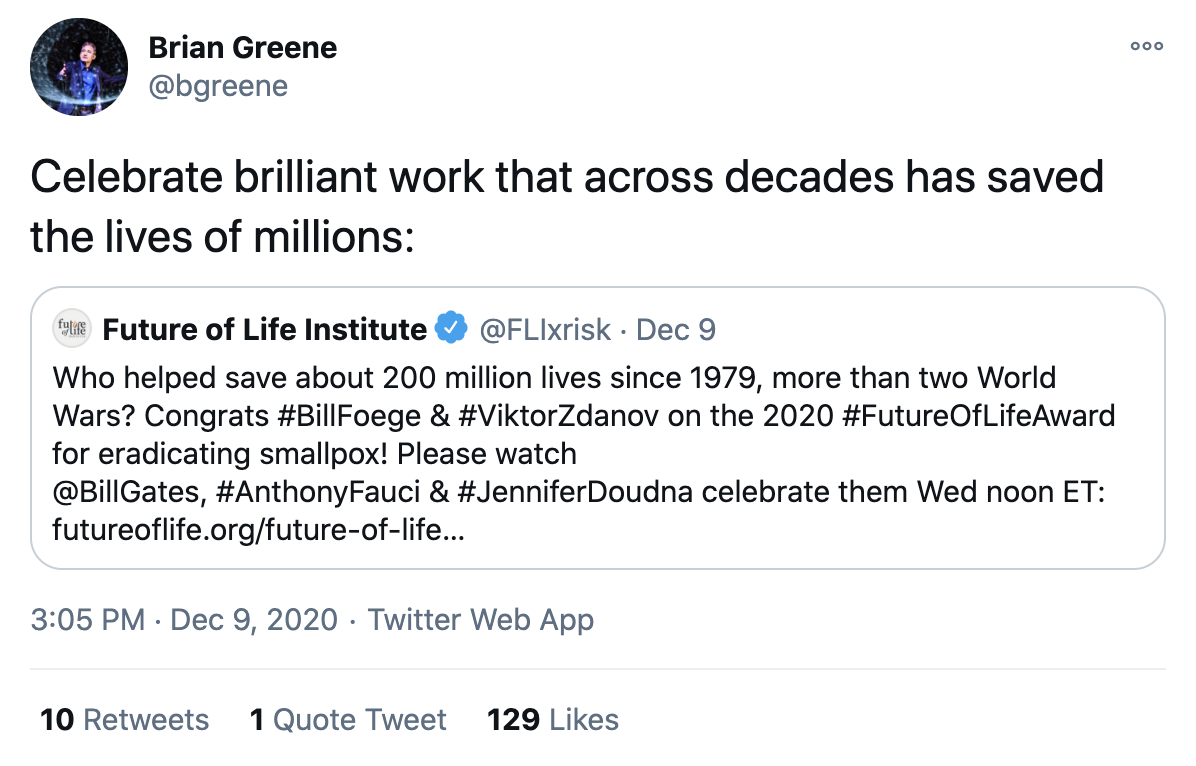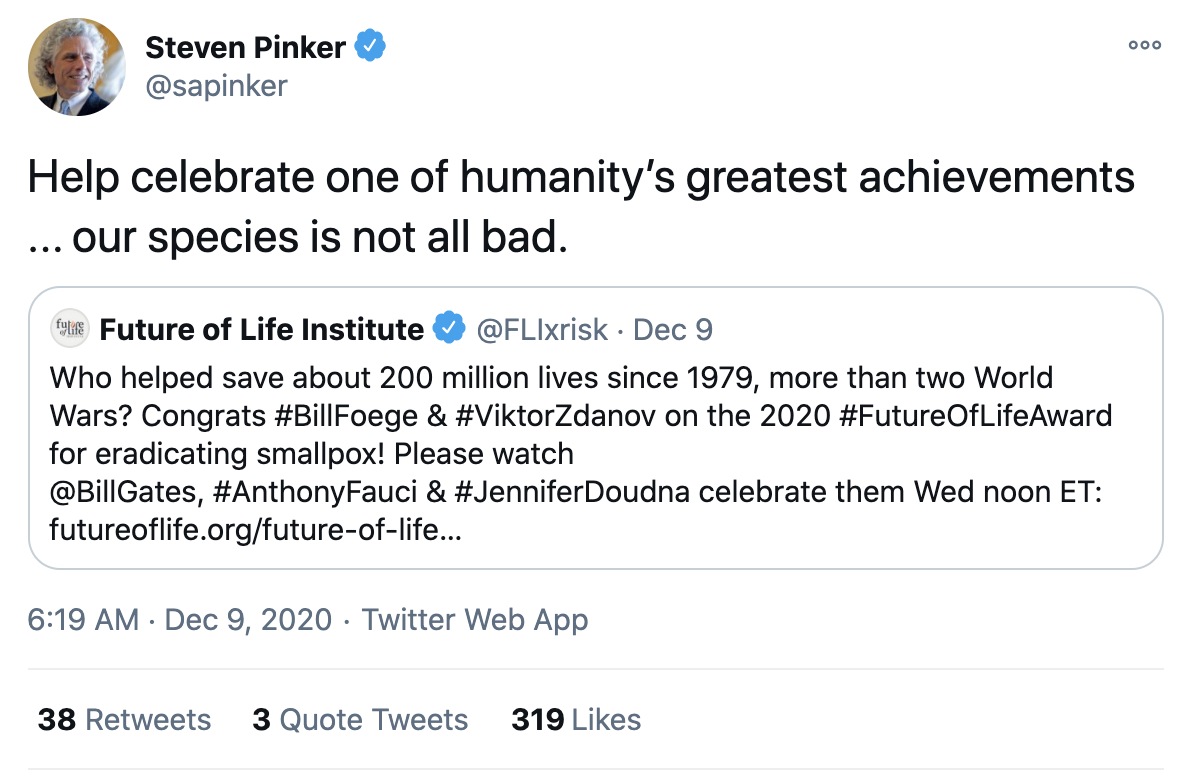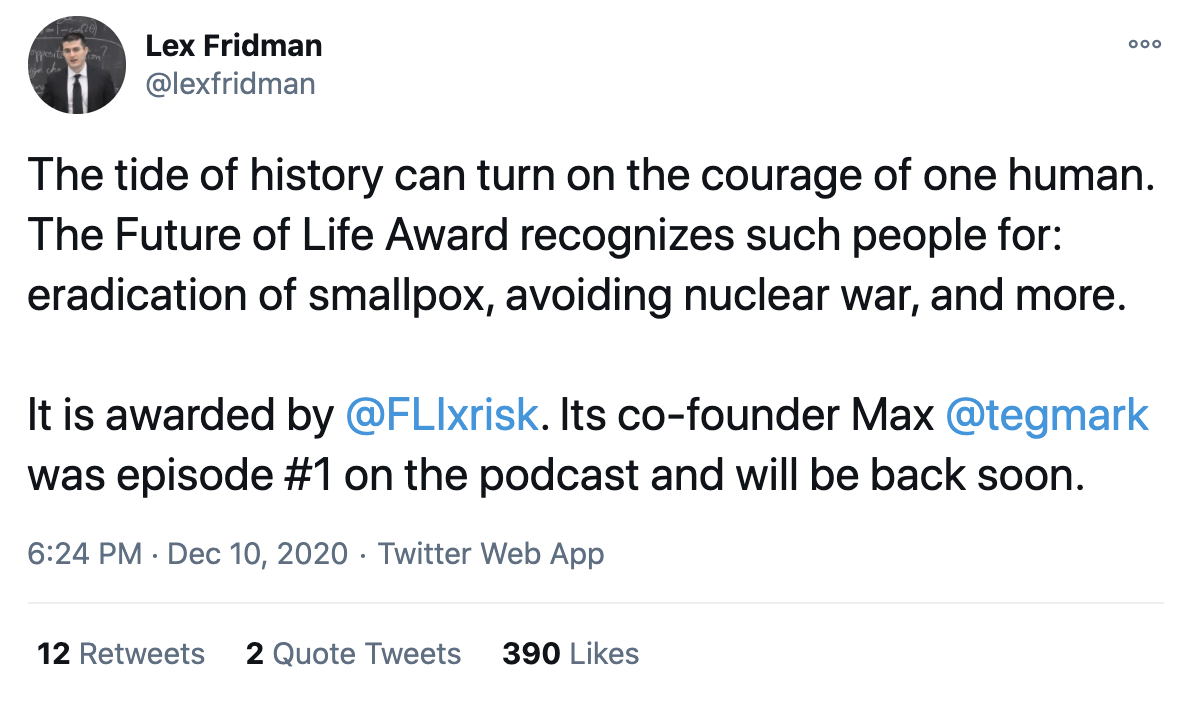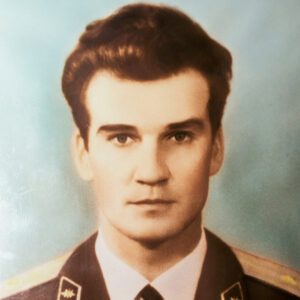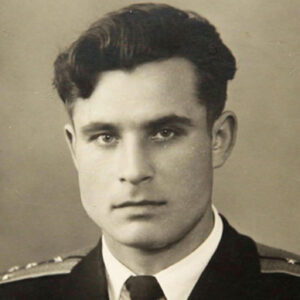The Future of Life Award 2020
Celebrating the contributions of Viktor Zhdanov and William Foege
Read the press release in Russian ![]()
Imagine how you’d react to the headline “Mutated coronavirus discovered, killing 30% of those infected.” Smallpox was such a lethal virus, estimated to have killed 500 million people in its last century. Today, the 41st anniversary of its eradication is celebrated by honoring two of the heroes who made it happen: Dr. William Foege and Dr. Viktor Zhdanov will share the $100,000 Future of Life Award in an online ceremony including Bill Gates, Dr. Anthony Fauci and freshly minted Nobel Laureate Dr. Jennifer Doudna.
Viktor Zhdanov
William Foege
The lessons learned from defeating smallpox are highly relevant to the covid pandemic: “We’re all indebted to Bill Foege and Viktor Zhdanov for their critical contributions to the eradication of smallpox, which demonstrated the immense value of science and international collaboration for fighting disease”, said António Guterres, Secretary General, United Nations. “Bill Foege’s advocacy of surveillance and containment (applying water to the house on fire rather than the whole neighborhood) was very significant for the overall success”, said Harvard professor George Church. “Bill played a pivotal role in eradicating smallpox and deserves the Future of Life Award. I look forward to seeing what the next generation of public health students will accomplish—by following in this giant’s footsteps”, said Bill Gates.
Viktor Zhdanov has been called “the best person who ever lived” by Oxford professor Will MacAskill, for successfully persuading the World Health Assembly to initiate an eradication campaign where the USA and the Soviet Union collaborated despite the Cold War. Dr. MacAskill added: “Smallpox was one of the worst diseases to ever befall the human race, and its eradication is one of the greatest achievements of humanity. Bill Foege and Viktor Zhdanov should be celebrated for their contributions, and should inspire us today to take effective action to tackle the world’s most pressing problems.” “They are phenomenal examples of what it means to harness science for global health”, Bill Gates added.
UNICEF estimates that smallpox eradication has saved close to 200 million lives – so far. “In selecting Bill Foege and Viktor Zhdanov as recipients of its prestigious 2020 award, the Future of Life Institute reminds us that seemingly impossible problems can be solved when science is respected, international collaboration is fostered, and goals are boldly defined. As we celebrate this achievement quarantined in our homes and masked outdoors, what message could be more obvious or more audacious?”, said Dr. Rachel Bronson, President & CEO of the Bulletin of the Atomic Scientists. George Church gives examples of such seemingly impossible problems: “Smallpox eradication is a model for elimination of other human-specific diseases in the future, such as polio, measles, mumps, rubella and syphilis.”
While serving as the Soviet Union’s Deputy Minister of Health, Dr. Viktor Zhdanov persuasively argued at the Eleventh World Health Assembly meeting in 1958 that the world could eradicate smallpox within a decade with a united effort, and successfully lobbied the Soviet Union to donate 25 million doses of the smallpox vaccine to kickstart the effort in developing countries. The World Health Assembly accepted his proposal in 1959 under Resolution WHA11.54. Viktor Zhdanov passed away in 1987, and his award will be received by his sons Viktor and Michael in his memory.
While working for the Centers for Disease Control in Africa as Chief of the Smallpox Eradication Program, Dr. Bill Foege developed the highly successful surveillance and “ring vaccination” strategy to contain smallpox spread. This greatly reduced the number of vaccinations needed, ensuring that the limited resources available sufficed to make smallpox the first infectious disease to be eradicated in human history.
The award: The Future of Life Award honors those who take exceptional measures to safeguard the collective future of humanity. The 2017 award honored Vasili Arkhipov for single-handedly preventing a Soviet nuclear attack against the US in 1962, and the 2018 award celebrated Stanislav Petrov for helping avert an accidental nuclear war in 1983. The 2019 award honored Dr. Matthew Meselson for his remarkable contributions to getting biological weapons banned and focusing biology on curing rather than killing. The award is funded by Skype-cofounder Jaan Tallinn and presented by the Future of Life Institute (FLI), a non-profit organization advocating positive technology use. “By eradicating smallpox and banning bioweapons, biology is a role model for other sciences struggling to help and not harm”, said FLI president Max Tegmark. This dual nature of science was echoed by MIT biology Professor Jonathan King: “The victory over smallpox highlights both the power of science to help humanity, and also how science could do more good if we didn’t divert vast resources to developing new weapons of mass destruction. We need the world’s scientific community to draw inspiration from Foege and Zhdanov and press our political leaders to fund healthcare, not warfare.”
FLI’s Dr. Emilia Javorsky, a biotech entrepreneur, added: “As we embark on our journey to eradicate COVID in an environment plagued by mistrust and misinformation, Foege and Zhdanov have shown us that the seemingly impossible is possible. Their example illustrates the importance of rebuilding and restoring trust in science, between nations, and perhaps most powerfully, between each other.”
FLI Podcast – In Conversation with the Award Recipients
Featured Books
Viktor Zhdanov—my Husband, Elena Tatulova’s Diary
Viktor Zhdanov’s wife (under the pseudonym of Elena) wrote a book about her husband’s life that the team at FLI has translated into English. It includes many fictitious names but tells a real story, and gives a taste of who Viktor Zhdanov was like as a person, while diving deeper into his work. You can read it here.
House on Fire: The Fight to Eradicate Smallpox by William Foege
A story of courage and risk-taking, House on Fire tells how smallpox, a disease that killed, blinded, and scarred millions over centuries of human history, was completely eradicated in a spectacular triumph of medicine and public health. Part autobiography, part mystery, the story is told by a man who was one of the architects of a radical vaccination scheme that became a key strategy in ending the horrible disease when it was finally contained in India. You can find the book on Amazon here.
History of the Award
The Future of Life Award is a $50,000 prize given to an individual who, without receiving much recognition at the time, has helped make today dramatically better than it may otherwise have been. We are confident that there are many unsung heroes out there, who have done incredible work to ensure a beneficial future of life on Earth. We need your help to ensure they get the recognition and honor they deserve.
2019 Winner
Matthew Meselson
Dr. Meselson was a driving force behind the 1972 Biological Weapons Convention, an international ban that has prevented one of the most inhumane forms of warfare known to humanity. April 9th marked the eve of the Convention’s anniversary. Meselson’s long career is studded with highlights: proving Watson and Crick’s hypothesis on DNA structure, solving the Sverdlovsk Anthrax mystery, ending the use of Agent Orange in Vietnam. But it is above all his work on biological weapons that makes him an international hero.
The 2019 Future of Life Award to Dr. Matthew Meselson was covered in Vox, and you can see a video about Meselson’s life below.
2018 Winner
Stanislav Petrov
One of the closest calls occurred thirty-five years ago, on September 26, 1983, when Stanislav Petrov chose to ignore the Soviet early-warning detection system that had erroneously indicated five incoming American nuclear missiles. With his decision to ignore algorithms and instead follow his gut instinct, Petrov helped prevent an all-out US-Russian nuclear war, as detailed in the documentary film “The Man Who Saved the World”.
The 2018 Future of Life Award to Stanislav Petrov was covered in Vox, Daily Mail, and The Daily Star.
2017 Winner
Vasili Arkhipov
Vasili Arkhipov single-handedly prevented nuclear war during the height of the Cuban Missile Crisis. Arkhipov’s submarine captain, thinking their sub was under attack by American forces, wanted to launch a nuclear weapon at the ships above. Arkhipov, with the power of veto, said no, thus averting nuclear war.
The 2017 Future of Life Award to Vasili Arkhipov was covered in The Times, The Guardian, The Independent, and The Atlantic.


